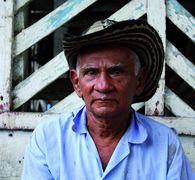Article published in the special Newsletter '15 years of PBI', October 2009
Mariana Niessen, volunteer from Brasil (2005-9)
Amidst threats and attempts on their lives, small farmers from the Curbaradó river basin (Chocó Department) fight to recover their lands.
In January 2006 PBI received a petition to accompany the Inter-Church Justice and Peace Commission (CIJP) to the home of small-scale farmer Enrique Petro, and then on to his farm, which was located in the middle of an African palm plantation in Curbaradó. This was the second time in less than one month that CIJP had requested accompaniment from PBI to visit this region. It is an area affected by land disputes, whose remote location requires a one-day journey traversing a large area of African palm plantations.
In October 2005, Petro and a member of CIJP witnessed the kidnapping of Orlando Valencia, a leader from this region and spokesperson on environmental damage caused by the cultivation of African palm in the area. Valencia’s body appeared days after the abduction, lifeless in a river. The purpose of this evil act appeared to be to sow fear and to weaken the organisational processes of the small farmers in Curbaradó, who had been dispossessed of their lands from 1996 onwards by military actions with alleged paramilitary participation. These operations resulted in the destruction of their properties and the native forest. It also opened the way for the mass cultivation of African palm on these lands, which belong to the Afro Colombian communities under constitutional law.
In spite of these difficulties, Petro was determined to recover his land and to make it possible for other small farmers to build a humanitarian zone on his old farm, which would make it possible for them to organise themselves in order to return to their lands. Our accompaniment on this journey provided protection to members of CIJP and to Petro. The purpose of the visit was to establish a plan of action to begin the process of return.
It was not a simple journey of accompaniment. We walked for four hours under a burning sun without any chance to shelter in the shade. We were in the midst of a plantation of African palm trees and had to put up with the looks of the workers and security personnel on the cultivations. This was the first time that PBI had undertaken this journey on foot, showing international accompaniment and putting its power of dissuasion to the test. As well as the political challenge, we faced the physical and mental challenge of carrying all the food, mats and water for the days that we would be staying in the heart of the plantations, waking with fear if a dog started barking, or listening to imaginary footsteps. Is that someone approaching the house?
Local self-protection initiatives
Numerous communities in the country have been searching for ways to protect themselves from the armed conflict that besieges Colombia. Several indigenous communities have what they call «permanent assemblies», places clearly identified as zones of refuge for the civilian population. Similarly, the communities of Bajo Naya have created what they call «places of refuge».
PBI accompanies several communities in Urabá that utilise the concept of Humanitarian Zones, clearly delineated areas identified by fencing and placards. The entry into these zones of any armed person is prohibited. These spaces seek to locally adapt the concept of protected zones provided for in International Humanitarian Law. They seek compliance with the principle of distinguishing between combatants and the civilian population, which is fundamental for those civilians caught in the middle of both internal and international armed conflicts.
The communities have also sought to protect the environment, as caring for it is essential for their continued ability to live in their territories. For this reason they have created special zones, such as the Biodiversity Zones in the Urabá region, for the protection of natural resources, fauna and flora, and to confront agricultural expansion and land seizure. In the Magdalena Medio region, following a long process that began in 1998, the Colombian Institute for Agrarian Reform (INCORA) finally accepted the creation of the Peasant Reserve Zone of the Cimitarra River Valley. The following year the Colombian government decided to suspend this zone «for reasons of general interest». Today the Peasant Farmers’ Association of the Cimitarra River Valley (ACVC) continues to insist that this suspension be lifted.

